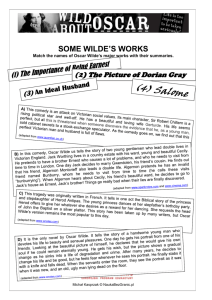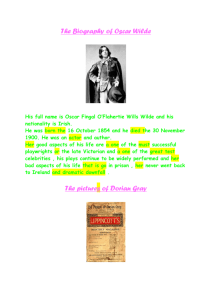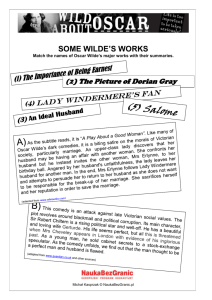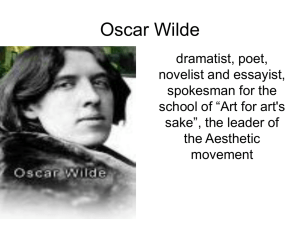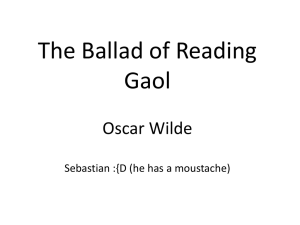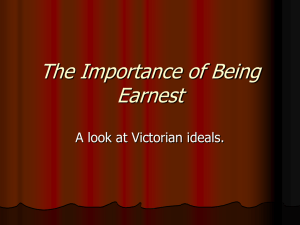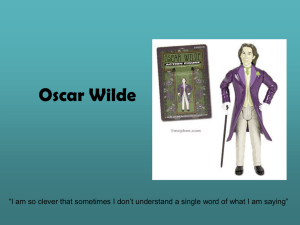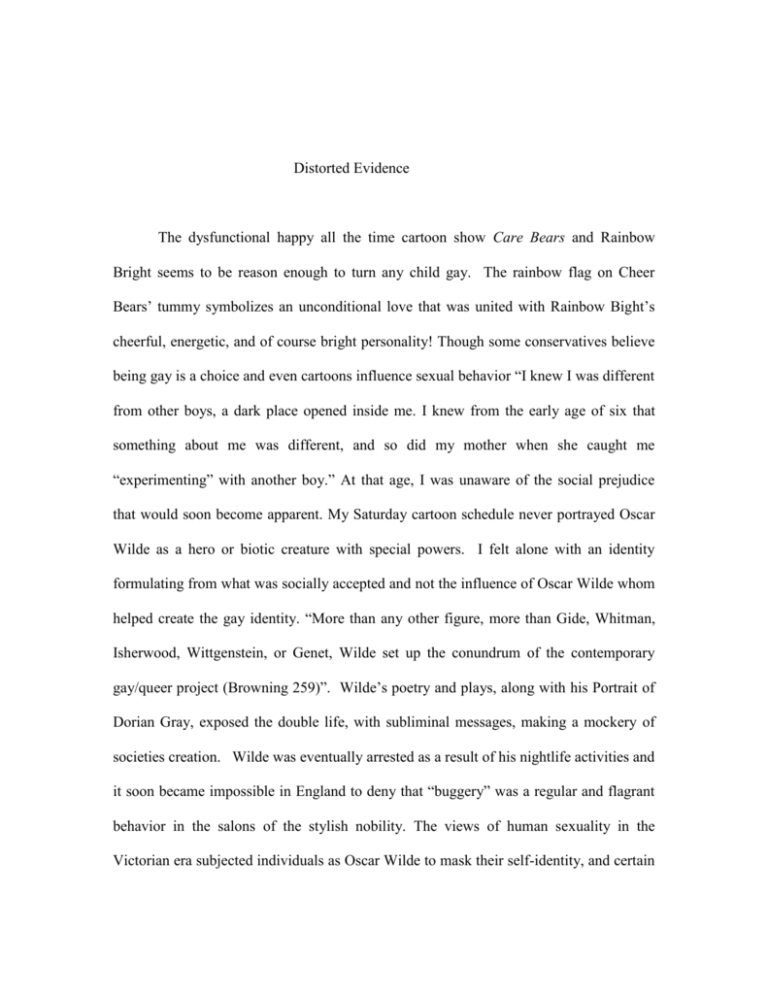
Distorted Evidence
The dysfunctional happy all the time cartoon show Care Bears and Rainbow
Bright seems to be reason enough to turn any child gay. The rainbow flag on Cheer
Bears’ tummy symbolizes an unconditional love that was united with Rainbow Bight’s
cheerful, energetic, and of course bright personality! Though some conservatives believe
being gay is a choice and even cartoons influence sexual behavior “I knew I was different
from other boys, a dark place opened inside me. I knew from the early age of six that
something about me was different, and so did my mother when she caught me
“experimenting” with another boy.” At that age, I was unaware of the social prejudice
that would soon become apparent. My Saturday cartoon schedule never portrayed Oscar
Wilde as a hero or biotic creature with special powers. I felt alone with an identity
formulating from what was socially accepted and not the influence of Oscar Wilde whom
helped create the gay identity. “More than any other figure, more than Gide, Whitman,
Isherwood, Wittgenstein, or Genet, Wilde set up the conundrum of the contemporary
gay/queer project (Browning 259)”. Wilde’s poetry and plays, along with his Portrait of
Dorian Gray, exposed the double life, with subliminal messages, making a mockery of
societies creation. Wilde was eventually arrested as a result of his nightlife activities and
it soon became impossible in England to deny that “buggery” was a regular and flagrant
behavior in the salons of the stylish nobility. The views of human sexuality in the
Victorian era subjected individuals as Oscar Wilde to mask their self-identity, and certain
publications opposing the Church’s moral stance lead to the modern suppressed identity
of the homosexual community.
Wilde was not just another gay poet and playwright who lived ahead of his time.
He was a pioneer who recognized and celebrated the charade as reality—just as modern
gay culture does. Oscar Wilde is the founding father of modern gay culture, writing The
Truths of Mask in 1885, depicting the underlined suppressed self. Society is engaged in
the conscious creation of ones identities, inventing profiles and personalities that fit with
the fantasies of life. The modern self is a contrivance, a mask behind which often lies a
desperate desire to find one’s real identity. No group seems more adept at creating their
lives through masks than the gay community. Wilde led a life that entailed many masks,
“For he who lives more lives than one More deaths than one must die.1” The gay life,
while humorously advertised by drag-queens and Hollywood’s motion pictures
broadcasting fags as whores, drug addicts, and weak in society. The gay public image is
perpetually being cut, trimmed, dyed and reshaped to create an image of what is the
“norm” or excepted in the heterosexual society.
The Victorian era foreshadowed many political problems resulting to Oscar
Wilde’s persecution, and the taboo issue of homosexuality. The Victorian era, which
lasted from 1833-1889, was one of the most religious times in the world. The Church
“…recognizing the positive value of traditional Christian moral teaching2” encouraged
the Enlightenment during this period. Oscar Wilde lived in the middle of the reformation
of the Church, the constant conflict of the Protestantism and Catholicism. The spread of
2.
2
Walter Kenilworth, A Study of Oscar Wilde: (New York: R.F. Fenno & Company, 1912), 15
Desmond Brown, The Idea of the Victorian Church: (London: McGill University Press, 1968), 3
Protestantism contributed to a series of religious wars between Catholics and Protestants.
The Church during this period was on a mission to bring back followers to the Church
and regain political power with the Victorian England.
The boisterous writer who stirred up much controversy in the late 1800’s was
viewed as immoral and did not keep with the upstanding values of the Church. “Most
Victorian writers who were interested in the religious influences in the lives of their
contemporaries remarked on the idea which was in the air that the Church was in some
sense a moral engine to elevate society.3” The Church sought out to make an example of
any unholy individuals who went against the teaching of the Holy Bible, an attempt to
reclaim power that was being over thrown by nonconformist.
The saying that ‘a picture tells a thousand words’ does not describe the works of
Oscar Wilde. The brilliance that Wilde portrays through his works goes beyond black and
white; he broke the rules and engaged in self-determination, which brought a country to it
knees. Oscar Wilde is often regarded as a man before his time, a martyr in helping
surface the modern homosexual eroticism. Not only did he depict the truth he broke
away from his place in society that expected traditional conformity. The Picture of
Dorian Gray written in 1891, enhanced many criticisms of ethical behavior not being met
by Wilde.
“One is struck by the profusion of such terms [in the reviews of Dorian Gray] as
unclean, effeminate, studied insincerity, Wardour Street aestheticism, obtrusively
cheap scholarship, vulgarity, unnatural, false perverted: an odd mixture of rumors
3
Desmond Brown. The Idea of the Victorian Church: (London: McGill University Press, 1968),393
of Wilde’s homosexuality and more overt criticism of Wilde as a social poseur
and self-advertiser.4”
The Picture of Dorian Gray written by Wilde received many reviews that were closedminded and believed to be works of the Devil. The Church made it a point to use the
negative publicity to their advantage enhancing pious views within the cultural setting;
subjecting Wilde as an example of what not to be socially affiliated with. The advantages
Oscar Wilde held onto were his economical status in the community; bourgeois (the
middle class) would have never been able to play a pivotal role as Wilde in presenting the
taboo issue of homosexuality.
The truth Wilde spewed towards the end of the century lead him to imprisonment
while being asked his sexual orientation. Yet, the bravery that Oscar Wilde exemplified
brought many changes to the modern gay culture and opened the doors to homosexuality,
“Wilde’s poetry and playsopened up and revealed the charade.5” The Church could no
longer pacify homosexuality as something unspoken, conceivable to the modern day
‘don’t ask don’t tell policy.’ According to the article in Victorian Poetry, the author
writes with great contempt towards Oscar Wilde,
“…Wilde’s particular form of hasty, poorly theorized iconoclasm so
disastrously enhanced and harshly punished in his own dayis still manifested over a
century later in radical sexual engagements with surrounding, conservative cultural
forces,” displaying that although Wildean works are viewed as a stepping stone to
hummanatarism his works are still viewed as a back lash to the modern gay culture.
Furthermore, it is believed that Wilde manipulated his own idealistic views to enhance
4
5
Ed Cohen Writing Gone Wilde: Homoerotic Desire in the Closet of Representation
Frank Browning, The Culture of Desire: New York: Crown Publishing, 1993), 209
his…”Victorian obsession with moralizing6”, regardless of Wilde’s motive he indirectly
help create the modern gay identity. Although Oscar Wilde’s views may seem unethical
to some critics great works derived through the oppressed pain endured in the 19th
century, which opened the door to sexuality studies, and writings, thus continuing the
effort to stop an oppressed community through literature creating knowledge.
Of course, the idealistic view of what is ethical derives from the Church, and
those views steam down into a society that conforms out of fear of the unknown. “I often
cried and prayed that the devil would take my soul, yet I never got a response. The
paradox of it all, I believed in God so heavy- hearted that I knew he was going to make
things better for me. I read my bible, went to church, but soon found that God was not
listening to me, and perhaps Oscar Wilde. Individuals can only be oppressed for so long
until actions are necessary. Oscar Wilde wanted obtain a sense of non isolation in
society. Wilde wrote a book on The Soul of Man, and the isolation that is inherent in
society,
“that individualism does not come to man with and sickly cant about duty, which
merely means doing what other people want because they want it; or any hideous
cant about self sacrifice, which is merely a survival of savage mutilation. In fact,
it does not come to man with any claims upon him at all. It comes naturally and
inevitability out of man. It is the point where all development tends,7”
he functioned out of self-development, thus causing him to create the identity that
persecuted him and labeled him as an outcast.
6
ibid.,468
514.Joyce, Simon, “Sexual politics and the aesthetics of crime: Oscar Wilde in the nineties,” ELH 69
(Summer 2002): 501-23.
7
It is evident that individuals in Victorian era were pressured to keep conformity and mask
their “true” identity; for the sake of the Church and the moral stance.
Certain
publications had been considered to be socially unexpected and not a sources of
individuality, instead being perverse, erotic, and unnatural. This leads me to believe that
although Oscar Wilde bridged the gap between the norm it would be nieve to believe that
individuals in the modern homosexual community do not suppress their identity. It is
evident that Oscar Wilde’s works put homosexuality on the map, yet as pointed out in
this paper the idea of homosexuality may have misinterpreted as one individuals views,
thus meaning that the homosexual community marks a stigma. “I have no problem with
homosexuality. I have a problem with homosexual acts.8” In voicing this statement, one
is only conceived to believe that if a hierarchy individual believes such slander then the
modern day homosexual community will live with a distorted self-image as Oscar Wilde
depicted with his masked identity. Although Oscar Wilde’s work lives on today, the goal
still holds strong that individuals must face individuality no matter the persecution.
Senator Rick Santorum made a statement in regards to homosexuality. “I have no
problem with homosexuality. I have problem with homosexual acts” (“Rick Santorum”).
In voicing this double talk, one is only conceived to believe that if a hierarchy individual
believes such slander then the modern day homosexual community will live with a
distorted self-image as Oscar Wilde depicted with his masked identity. Although Oscar
Wilde’s work lives on today, the goal still holds strong that individuals must face
individuality regardless the persecution.
Sean Loughlin, “Conservative group faults GOP for 'timid' support of senator,” CNN 2003,
<http://www.cnn.com> (24 April 2003).
8
Work Cited
Frank Browning, The Culture of Desire: New York: Crown Publishing, 1993), 209
Walter Kenilworth, A Study of Oscar Wilde: (New York: R.F. Fenno & Company,
1912), 15
Desmond Brown, The Idea of the Victorian Church: (London: McGill University Press,
1968),
Ed Cohen Writing Gone Wilde: Homoerotic Desire in the Closet of Representation
468. Hall E. Donald, “Is There a Queer Ethics,” Victorian Poetry 38 (Winter 2000):
467-89
514.Joyce, Simon, “Sexual politics and the aesthetics of crime: Oscar Wilde in the
nineties,” ELH 69 (Summer 2002): 501-23.
Sean Loughlin, “Conservative group faults GOP for 'timid' support of senator,” CNN
2003, <http://www.cnn.com> (24 April 2003).

